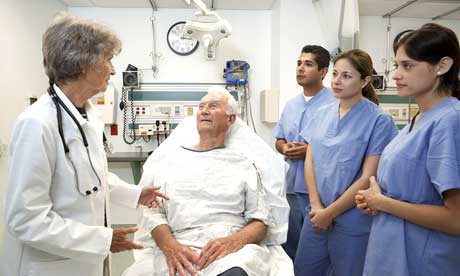
From the white cube to the white coats! For real! This press release about having McMaster U med students study art landed in my inbox recently:
A new program for Family Medicine residents at McMaster University is taking them out of the clinic and into the art gallery, with an aim to make them better family physicians.
It is all part of an innovative new visual literacy course, being offered through the McMaster Museum of Art in conjunction with the Department of Family Medicine.
“Research has shown that doctors can improve their observation and diagnostic skills by studying works of art,” says Carol Podedworny, director of the McMaster Museum of Art. “When students – or in this case Family Medicine residents – learn to appreciate fine art on a deeper level, our hope is they will translate those skills into medical practice and become better communicators, particularly with their own patients.”
Eight second-year Family Medicine residents will participate in the bi-weekly sessions, where they will examine original works of art from the Museum’s vast collections and participate in group discussions to explore meaning within the imagery.
“As a family physician, it can be easy to make assumptions about a patient but we’re trying to train our residents to look deeper, to really understand the patient’s experience of illness and to improve their understanding of the complex nature of human beings,” says Dr. Joyce Zazulak, an associate professor in the Department of Family Medicine and co-leader of the program. “One of the goals of this program is to promote self-awareness, which the residents will take into their professional lives as physicians. This will truly give new meaning to the term ‘I’m going to see my patient now”.
A paper published by the Harvard Medical School in 2008 found that medical students who were assigned to take an art appreciation course at the university museum –who examined various works of art to hone their observational, analytical and communication skills—were 38 per cent more successful in making accurate medical diagnoses than those who didn’t take the course.
“Through a series of interactive workshops, exercises and exposure to a variety of works of art throughout history, the residents will develop the skill of seeing beyond, learning to recognize symbols, messages, images, and the story behind the work. These skills provide us with a greater understanding of perception, both in art and in life itself,” says Karen Scott Booth, an art educator who will be co-leading the sessions.
Maybe art really could be a matter of life or death? I've never been able to see things quite that way, but this news made me think that perhaps, one day, it could be so.
(Image of doctors in training from The Guardian)

one set of skills translates to another simply because it stimulates neural paths inside your brain. every time two (or more) activities cross paths on the neural network in same or different times, it works in support of each other.
ReplyDeleteam I making any sense? :D
Hey Amy,
ReplyDeleteYou do make sense! Definitely. Maybe I should try diagnosing some patients sometime... wouldn't get it right, but might help me see art better : )